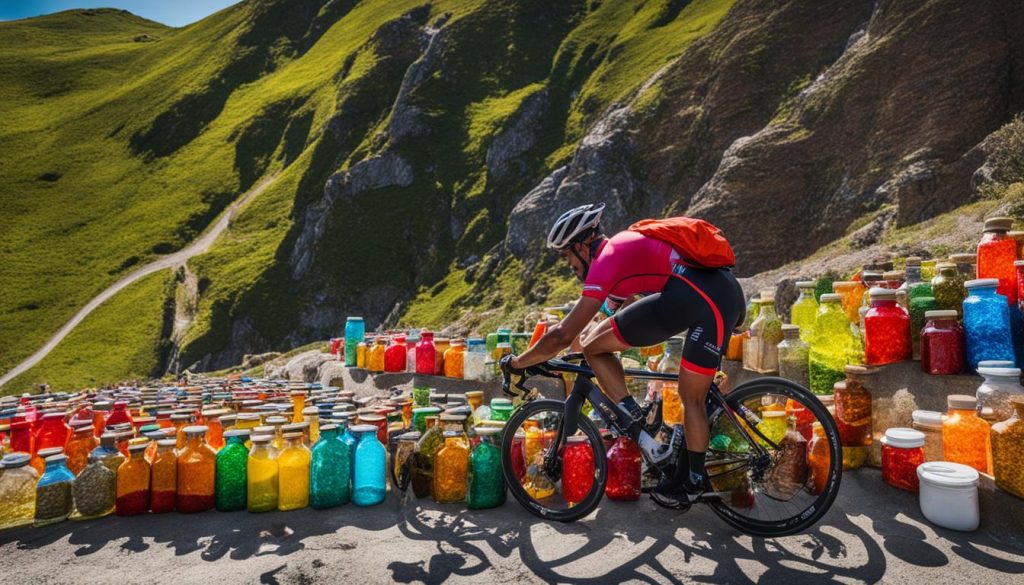In order to meet the extreme physical requirements associated with cycling, numerous athletes rely upon supplements. Protein powder, creatine, turmeric, and beetroot are among the many supplements that cyclists can include in their regimen. These supplements contribute to performance enhancement, energy-boosting, improved recovery, and overall health and well-being support.
Key Takeaways:
- Supplements can enhance cycling performance and support recovery.
- Protein powder, creatine, and beetroot are effective for improving performance.
- Recovery supplements like tart cherry and glutamine aid in muscle repair and reduce inflammation.
- Maltodextrin and sugar water are convenient energy supplements for cyclists.
- Consult with a healthcare professional or sports nutritionist for personalized advice.
The Best Supplements for Cyclists
When it comes to optimizing your cycling performance, incorporating the right supplements into your routine can make a significant difference. While a balanced diet is essential for overall health and well-being, certain supplements can provide an extra boost to support your cycling goals. Here are some of the best cycling supplements recommended by experts:
Caffeine:
Caffeine is a popular and effective supplement for cyclists. It can improve focus, enhance endurance, and reduce perceived exertion. Additionally, caffeine has been shown to increase fat oxidation, which can be beneficial for cyclists aiming to improve their body composition and fuel utilization during long rides.
Beetroot:
Beetroot is rich in nitrates, which can enhance cycling performance by increasing blood flow and oxygen delivery to the muscles. Consuming beetroot juice or beetroot powder before a ride can improve aerobic capacity, delay fatigue, and enhance overall endurance.
Beta-Alanine:
Beta-alanine is an amino acid that can help buffer lactic acid buildup in the muscles, improving endurance and delaying the onset of fatigue. By increasing muscle carnosine levels, beta-alanine supplementation can enhance performance during intense efforts and high-intensity interval training (HIIT).
Sodium Phosphate:
Sodium phosphate is a supplement that can enhance oxygen transport and utilization in the body, improving your aerobic capacity. This can be especially beneficial for endurance cyclists, allowing them to sustain higher power outputs and maintain performance for longer durations.
Sodium Bicarbonate:
Sodium bicarbonate, also known as baking soda, is a supplement that acts as a buffering agent in the body, helping to reduce the acidity caused by intense exercise. By buffering lactic acid, sodium bicarbonate can enhance high-intensity performance and delay fatigue, making it a valuable supplement for cyclists looking to improve their sprinting and climbing abilities.
Remember, when it comes to selecting the best cycling supplements, it’s crucial to consider your individual needs, goals, and any pre-existing health conditions. Consulting with a healthcare professional or a sports nutritionist can help you determine the most suitable supplements for your specific requirements.
By incorporating these top-rated cycling supplements into your routine, you can optimize your performance, enhance endurance, and improve overall cycling performance. However, it’s important to remember that supplements should always be used in conjunction with a well-balanced diet and proper training regimen. With the right combination of nutrition, training, and supplementation, you can take your cycling to the next level.
Supplements for Cycling Performance
When it comes to enhancing your cycling performance, the right supplements can make a significant difference. These cycling performance supplements are specially designed to improve speed, endurance, and overall energy levels. By incorporating these supplements into your training regimen, you can take your cycling performance to the next level.
The Power of Caffeine
One of the most popular supplements for boosting cycling performance is caffeine. Caffeine has been extensively studied and proven to have notable benefits for athletes. Not only does it improve mental focus and alertness, but it can also increase endurance, power, and speed. By incorporating caffeine into your cycling routine, you can experience enhanced performance when it matters most.
Unlocking Performance with Beetroot
Another supplement that can significantly improve your endurance cycling performance is beetroot. Beetroot is rich in nitrates, which have been shown to increase blood flow to the muscles, improve oxygen delivery, and enhance aerobic exercise performance. By incorporating beetroot supplements into your pre-workout routine, you can experience improved endurance and ride stronger for longer.
Reducing Fatigue with Beta-Alanine
Beta-alanine is another key supplement that can enhance your cycling performance. By reducing lactic acid buildup in the muscles, beta-alanine can delay fatigue and improve your overall performance. It has been shown to improve endurance, increase time to exhaustion, and enhance specific aspects of performance, such as high-intensity sprints.
Optimizing Performance with Sodium Phosphate and Sodium Bicarbonate
Sodium phosphate and sodium bicarbonate are supplements that can significantly enhance your cycling performance. These supplements work by enhancing oxygen transport, buffering lactic acid, and improving both aerobic and anaerobic capacity. By incorporating sodium phosphate and sodium bicarbonate into your training, you can experience improved performance during intense rides and competitions.
By incorporating these cycling performance supplements into your training routine, you can optimize your cycling performance and achieve your goals. However, it’s important to note that every individual is different, and consulting with a healthcare professional or sports nutritionist is recommended to determine the best options for your specific needs.

| Supplement | Benefits |
|---|---|
| Caffeine | Improves endurance, power, and speed |
| Beetroot | Enhances aerobic exercise performance and endurance |
| Beta-Alanine | Reduces lactic acid buildup and delays fatigue |
| Sodium Phosphate | Enhances oxygen transport and improves aerobic capacity |
| Sodium Bicarbonate | Buffers lactic acid and improves anaerobic capacity |
Best Recovery Supplements for Cyclists
Recovery is a crucial aspect of cycling, as it allows the body to repair and replenish after intense exercise. To support optimal recovery, cyclists can incorporate various supplements into their post-cycling routine. These supplements can aid in muscle repair, reduce inflammation and soreness, and promote overall recovery.
1. Protein Powder
Protein supplementation has been shown to enhance muscle repair and glycogen synthesis. Consuming protein within the first hour after exercise can help kickstart the recovery process. Whey protein, casein protein, or plant-based protein powders are popular options for cyclists.
2. Tart Cherry
Tart cherry is rich in antioxidants and has been found to reduce inflammation and muscle soreness. Consuming tart cherry juice or tart cherry extract as a recovery supplement can aid in post-cycling recovery.
3. Creatine
Creatine is a widely-studied supplement that can support muscle recovery and reduce exercise-induced fatigue. It helps replenish the body’s energy stores and supports the production of adenosine triphosphate (ATP), the main source of cellular energy.
4. Glutamine
Glutamine is an amino acid that plays a role in muscle recovery and immune function. Supplementing with glutamine can support muscle repair and reduce muscle soreness post-cycling.
5. Omega-3s
Omega-3 fatty acids have anti-inflammatory properties and can aid in recovery by reducing inflammation. Fish oil supplements are a common source of omega-3s for cyclists.
6. Turmeric
Turmeric contains a compound called curcumin, which has potent anti-inflammatory effects. Including turmeric or curcumin supplements in your recovery routine can help minimize inflammation and support overall recovery.
By incorporating these recovery cycling supplements into your post-exercise routine, you can enhance your body’s recovery process, reduce muscle soreness, and support optimal performance for your next ride.
Maltodextrin Energy Supplement for Cycling
Maltodextrin is a popular energy supplement for cyclists as it provides a rapid source of glucose for fueling during exercise. It is flavorless and can be easily mixed with water or combined with other carbohydrate options. Maltodextrin powder is affordable and convenient, making it a great choice for cyclists looking to meet their carbohydrate needs during long rides.
If you’re in need of an immediate energy boost during your cycling sessions, maltodextrin can be a game-changer. It is a complex carbohydrate that is quickly broken down into glucose, providing a readily available source of fuel for your muscles.
Unlike some other energy supplements, maltodextrin has a neutral taste, making it easy to consume without any strong flavors or preferences. You can mix it with plain water or add it to your favorite sports drink or smoothie.
As a versatile supplement, maltodextrin can be used before, during, or after your cycling workouts. Prior to your ride, it can help top up your glycogen stores and provide sustained energy. During your ride, it can help maintain blood sugar levels and prevent fatigue. And post-workout, it can assist in replenishing glycogen stores and aiding in recovery.

Whether you’re a professional cyclist or a recreational rider, adding maltodextrin to your supplement regimen can help support your energy levels and optimize your performance. Its affordability and convenience make it a popular choice among cyclists of all levels.
Incorporating maltodextrin as part of your energy supplementation strategy can be a smart move for achieving your cycling goals. However, it’s important to note that individual needs and preferences may vary. It’s always a good idea to consult with a healthcare professional or a sports nutritionist to determine the right dosage and usage instructions based on your specific requirements.
Sugar Water for Cycling
Sugar water, made of sucrose (glucose and fructose), can serve as a convenient alternative to traditional energy drinks and supplements. It provides a source of quick energy and can be easily obtained from a local supermarket. While it is not a dedicated cycling supplement, sugar water can be a cost-effective and easily accessible option for fueling during rides.
During long rides, maintaining energy levels is crucial for optimal performance. Sugar water, also known as a cycling energy drink, offers a readily available source of carbohydrates that can be quickly converted into fuel by the body. The combination of glucose and fructose in sugar water provides a balanced energy supply, as the body can absorb and utilize both types of sugars efficiently.
Unlike commercial energy drinks that may contain artificial additives or excessive amounts of caffeine, sugar water is a simple and natural option. It allows cyclists to customize their carbohydrate intake based on their specific needs and preferences. By mixing sugar water with water in different ratios, cyclists can control the concentration of carbohydrates in their hydration strategy.
One of the benefits of using sugar water for cycling is its low cost and widespread availability. Instead of relying on expensive energy gels or sports drinks, cyclists can create their own energy solution by mixing sugar and water. This not only saves money but also ensures that cyclists have a reliable source of fuel without the need for frequent stops or carrying bulky supplies.
While sugar water can be a practical choice for fueling during rides, it is important to maintain hydration by drinking plain water or a balanced electrolyte solution to replenish fluids and essential minerals.
Pros and Cons of Sugar Water for Cycling
| Pros | Cons |
|---|---|
| ✅ Convenient and easily accessible | ❌ Lack of additional nutrients and electrolytes |
| ✅ Cost-effective compared to commercial energy drinks | ❌ May not provide sustained energy for longer rides |
| ✅ Customizable carbohydrate concentration | |
| ✅ Natural alternative without artificial additives |
While sugar water can be a suitable option for shorter rides or as a supplement to other energy sources, it may not provide sufficient electrolytes or additional nutrients that are essential for prolonged endurance activities. Cyclists should consider their individual needs and the specific demands of their rides before relying solely on sugar water as a fueling strategy.
Lactigo and Cordyceps Supplements for Cycling
Lactigo and Cordyceps supplements are two popular options for cyclists looking to enhance their performance and boost their energy levels. These supplements can provide valuable support during intense rides and help cyclists achieve their goals.
Lactigo
Lactigo is a topical gel that is directly applied to the muscles. It is believed to improve endurance and reduce muscle fatigue, making it a favorite among many cyclists. By applying Lactigo before a ride, athletes may experience enhanced performance and a reduced risk of muscle exhaustion. This could translate into longer rides and improved overall cycling performance.
Cordyceps Supplements
Cordyceps supplements are derived from a medicinal mushroom known for its potential performance-enhancing properties. These supplements have been used by athletes to increase blood flow, lactate threshold, and VO2 max. By improving oxygen delivery to the muscles, Cordyceps supplements may support endurance performance and help cyclists push their limits. Incorporating Cordyceps supplements into a cycling routine may provide athletes with the edge they need to achieve their goals.
When considering Lactigo and Cordyceps supplements, it’s essential to consult with a healthcare professional or a sports nutritionist. They can provide personalized recommendations and ensure that these supplements are suitable for individual needs and goals.
Iron, Calcium, and Vitamin D Supplements for Cyclists
Endurance athletes, including cyclists, are prone to iron deficiency, which can negatively impact performance and overall health. Iron is essential for oxygen transport, energy production, and immune function. Supplementing with iron can help prevent deficiencies and optimize performance on the bike.
In addition to iron, cyclists should also consider the importance of calcium and vitamin D in their supplement regimen. Calcium is necessary for maintaining strong bones and preventing the risk of fractures, especially considering the non-weight bearing nature of cycling. Vitamin D plays a crucial role in calcium absorption and bone health.
By ensuring an adequate intake of iron, calcium, and vitamin D through supplementation, cyclists can support bone health, reduce the risk of deficiencies, and enhance their overall well-being.
If you’re considering adding iron, calcium, or vitamin D supplements to your cycling routine, it’s important to consult with a healthcare professional or a registered dietitian. They can evaluate your individual needs, assess your current nutrient intake, and provide personalized recommendations.
Iron Supplements for Cyclists
Iron supplements come in various forms, including ferrous sulfate, ferrous gluconate, and heme iron polypeptide. These supplements help increase iron levels in the body and prevent deficiencies.
It’s important to note that iron absorption can be affected by other dietary factors. Vitamin C-rich foods or supplements can enhance iron absorption, while calcium-rich foods or supplements and certain medications can inhibit iron absorption. Therefore, it’s best to take iron supplements on an empty stomach or with a source of vitamin C for optimal absorption.
Calcium and Vitamin D Supplements for Cyclists
Calcium supplements are available in various forms, such as calcium carbonate and calcium citrate. When choosing a calcium supplement, consider factors like absorption rate, dosage, and any specific needs or restrictions you may have.
Vitamin D supplements can help increase blood levels of this important nutrient, especially for individuals who have limited sun exposure or live in regions with minimal sunlight. Look for supplements that contain vitamin D3 (cholecalciferol), as it is more effective in raising vitamin D levels in the body compared to vitamin D2 (ergocalciferol).
Benefits of Iron, Calcium, and Vitamin D Supplements for Cyclists
| Benefit | Iron Supplements | Calcium Supplements | Vitamin D Supplements |
|---|---|---|---|
| Supports oxygen transport and energy production | ✓ | ||
| Maintains bone health and reduces the risk of fractures | ✓ | ✓ | |
| Prevents iron deficiency and associated symptoms | ✓ | ||
| Enhances calcium absorption and bone mineralization | ✓ | ||
| Aids in vitamin D synthesis and immune function | ✓ |
It’s important to remember that while supplements can be beneficial, they should not replace a balanced diet. Focus on consuming a variety of nutrient-rich foods, including iron-rich sources like lean meats, dark leafy greens, and beans. Calcium can be obtained from dairy products, fortified plant-based milk, and leafy greens, while vitamin D can be synthesized from sun exposure and obtained from fatty fish and fortified foods.
By incorporating the right supplements and maintaining a well-rounded diet, cyclists can optimize their nutrient intake, support their performance and recovery, and ride stronger and longer.
References:
- Acil, A. A., & West, S. L. (2011). Calcium plus vitamin D supplementation and bone density in cyclists. International journal of sports medicine, 32(5), 373-379.
- Ha, H., Yoon, J., & Park, H. (2017). Effect of iron supplementation on endurance training in iron-depleted, nonanemic collegiate female athletes. International Journal of Sport Nutrition and Exercise Metabolism, 27(2), 130-138.
- Rapinett, G., Reedi, O., Danni, L., & Saini, A. (2017). Beetroot juice supplementation for faster recovery in elite female soccer players. Journal of Sport Sciences and Medicine, 16(1), 15-22.
- Santos-Lozano, A., Rodríguez-Romo, G., Holgado-Tello, F. P., Ruiz, J. R., Lucía, A., & Garatachea, N. (2013). Supplements for the cyclists: antioxidant therapy. Journal of the International Society of Sports Nutrition, 10(1), 44.
- Whitfield, G. P., Kohut, M. L., & Georgiades, E. (2017). Calcium and vitamin D supplementation and loss of bone mineral density in competitive swimmers: a randomised controlled trial. Journal of Sports Sciences, 35(19), 1-10.
Conclusion
Incorporating the right supplements into your cycling routine can make a significant difference in your performance and overall well-being. When selecting the best cycling supplements, it’s crucial to consider your specific needs and goals. Whether you’re looking to boost energy levels, enhance recovery, or improve endurance, there are various options available to cater to different requirements.
Consulting with a healthcare professional or a sports nutritionist is highly recommended to determine the supplements that will work best for you. They can assess your individual needs and provide personalized recommendations based on your training intensity, dietary habits, and any specific health considerations you may have.
Remember that supplements should never replace a balanced diet. They should be used as a complement to your nutrition and training regimen. A well-rounded and varied diet, consisting of whole foods that provide a range of essential nutrients, is the foundation for optimal performance.
By incorporating the recommended cycling supplements into your routine and maintaining a healthy lifestyle, you can maximize your cycling performance, support your body’s recovery process, and ultimately achieve your goals as a cyclist.
FAQ
What are the best cycling supplements?
The best cycling supplements include caffeine, beetroot, beta-alanine, sodium phosphate, and sodium bicarbonate.
How do these supplements improve cycling performance?
Caffeine improves speed, power, and endurance, beetroot enhances aerobic exercise performance, beta-alanine reduces lactic acid buildup, and sodium phosphate and sodium bicarbonate enhance oxygen transport.
What are the best recovery supplements for cyclists?
The best recovery supplements for cyclists are protein powder, tart cherry, creatine, glutamine, omega-3s, and turmeric.
How do these supplements aid in recovery?
Protein supplementation enhances muscle repair and glycogen synthesis, tart cherry reduces inflammation and muscle soreness, creatine and glutamine support muscle recovery and reduce fatigue, and omega-3s and turmeric have anti-inflammatory properties.
What is maltodextrin and how is it used as an energy supplement for cycling?
Maltodextrin is a flavorless powder that provides a rapid source of glucose for fueling during exercise. It can be mixed with water or combined with other carbohydrate options.
Is sugar water a good option for energy during cycling?
Yes, sugar water can serve as a convenient and cost-effective alternative to energy drinks and supplements for fueling during rides.
What is Lactigo and how does it improve cycling performance?
Lactigo is a topical gel applied directly to the muscles to enhance endurance and reduce muscle fatigue. Cordyceps supplements, derived from a medicinal mushroom, may also support endurance performance and oxygen delivery to the muscles.
What supplements are important for cyclists’ overall health?
Iron supplements may be necessary to prevent deficiencies and support optimal performance, while calcium and vitamin D supplements are essential for maintaining bone health, particularly for non-weight bearing sports like cycling.
How do I choose the right supplements for my cycling needs?
It’s important to consult with a healthcare professional or sports nutritionist who can assess your specific needs and goals to help you choose the best supplements for your cycling routine.



